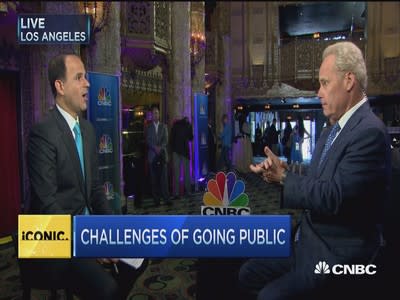Why business guru Marcus Lemonis won't go public

While there are benefits for companies that decide to go from private to public, serial investor and entrepreneur Marcus Lemonis said Tuesday there's a reason he's not interested in offering shares of his companies to public investors.
"I'm not a seller. I'm a holder," he said in an interview with " Power Lunch " from the CNBC iConic conference in Los Angeles.
Lemonis, CEO of Camping World and Good Sam Enterprises, leads more than 6,000 employees in over 100 cities across the United States. The only reason he'd ever want to offer shares in his companies to the public is to give people the opportunity to invest side by side with him, he said.
"If I ever took a business public I wouldn't want to take the shares off the table," Lemonis explained. "I don't want people thinking I'm doing it just to make money and then going to run for the hills. I think that's a very important distinction."
It's not uncommon for founders and early investors of private companies to sell shares during an initial public offering. When Facebook (NASDAQ: FB) went public in 2012, about 241.2 million shares came from existing shareholders . Founder Mark Zuckerberg sold more $1.1 billion worth of stock at the time in order to pay taxes.
Read More Companies that act like start-ups
Just because Lemonis hasn't decided to take the plunge himself, he said there are benefits to a company going public. Not only does it provide liquidity for the business, it also will ensure there is a succession plan in place, he noted.
"Businesses are going to exist long after you and I are gone so what's the plan going to be? A public vehicle provides the structure, the discipline and the board structure-it's just a lot clearer for the business," said Lemonis, who stars in CNBC's " The Profit ."
Kip Tindell, CEO of The Container Store (NYSE: TCS), said going public in 2013 was the right decision for his company. The alternative would have been to either find another private equity investor or become a takeover target.
"One of the best things about it is that you get to get more stock in the hands of employees," Tindell told "Power Lunch."
However for Life Is Good co-founder and CEO Bert Jacobs, staying private is really the only option for his business, which shuns advertising and donates 10 percent of its net profits to help kids in need.
By going public it becomes "very difficult to become focused on anything but dollars per share per quarter and for us, the business is a tool to do more than just make profit," he said.
Read More Life is Good's $100 million ad-free global success story
-CNBC Kerima Greene and The Associated Press contributed to this report.
Join America's most influential entrepreneurs such as Bob Parsons , founder of GoDaddy and CNBC's The Profit Marcus Lemonis in person at iCONIC in LA on June 23.
More From CNBC

 Yahoo Finanzen
Yahoo Finanzen 
